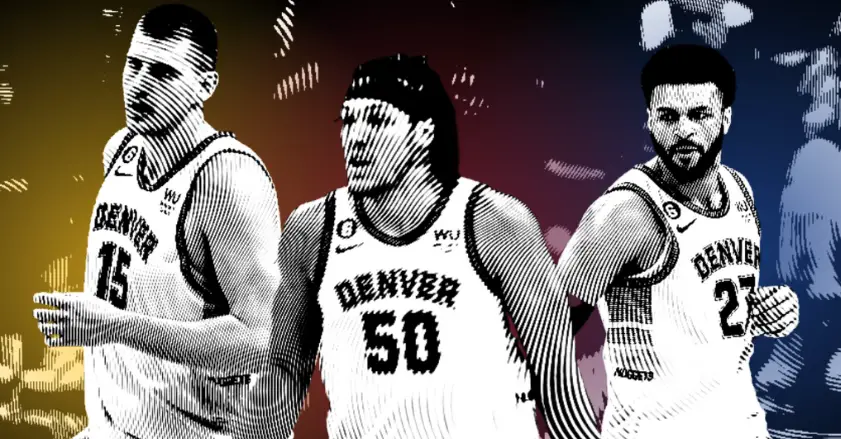The 2023 Finals concluded with a fittingly hideous, appropriately frantic Game 5 Monday night. The Denver Nuggets clinched their first-ever NBA championship, fighting off a battered, bloodied, determined, but ultimately powerless Miami Heat squad with alacrity, if not ease.
Nikola Jokic has a ring now, which naturally has set off thousands of premature “where does he rank historically” conversations. It’s undoubtedly validating for Jokic and his supporters (*waves*). The bling will also likely lead to some future All-Star selections (and more?) for Jamal Murray, who has proven himself on the biggest stage in a way some of his more decorated Western peers have not, and perhaps even Aaron Gordon.
(The Nuggets also did a good job remaining cheap patient with coach Michael Malone. Eight years with the Nuggets hilariously makes him the fourth-longest tenured coach in the NBA. Most franchises would have fired him somewhere along the ride just for the sake of firing someone.)
But the ripples of the Nuggets championship spread farther. Most impactfully, it finally nails the coffin shut on the idea that particular player and team archetypes can’t win a title.
In this most recent case, there was a concern that teams couldn’t win a championship building around a ground-bound, offensively-oriented center. Big men are the linchpin of a team’s defense, so the thinking goes, and if a squad’s best big wasn’t a rim protector, they would always be vulnerable to the elite offensive creators that the playoffs invariably bring.
Ask Devin Booker and Kevin Durant how they feel about that line of thinking.
The worries about Joker have been put six feet under for good. His defense rose to another level during the playoffs (I highly recommend you read Michael Pina’s fantastic breakdown on that subject), but you don’t need advanced analytics to notice how much trouble Miami had at the rim against Jokic — supposedly his bugaboo. His quick hands interrupted the timing of the Heat’s trademark interior passes, and his sheer size proved a problem for the undersized Miami frontline.
But at the end of the day, Nikola’s defense wasn’t really the key, as much as everyone would love to say otherwise. His offensive everythingness just provided too high a floor for Denver to fail four times in seven games against anyone. Erik Spoelstra threw the kitchen sink at Nikola Jokic, and he turned it into a throne.
Jokic’s coronation is yet another example that absence of evidence is not the same thing as evidence of absence. Assuming an unusual player can’t reach the summit is backward-looking and, frankly, stupid. Believe your eyes.
Jump-shooting teams couldn’t win a championship until the Warriors dynasty arrived. Concerns about Giannis’ outside shot prompted NBA “analysts” to say that the Bucks couldn’t crest the summit unless he became the Robin to someone else’s Batman. Then, there was Jokic. And that’s just in the last decade!
There are no hard-and-fast rules for championship contenders anymore (and there never were; we just couldn’t acknowledge that reality). There’s only one champion crowned per year, and so many teambuilding rules are based on small-sample views. It’s a copycat league, after all. Too many fans and executives conflate things that haven’t happened with things that can’t happen, and it restricts their creativity.
However, the best players don’t have a ceiling; they may just need to take a different launch angle to enter orbit.
What do Steph Curry, LeBron James, Kevin Durant, Kawhi Leonard, Giannis, and Jokic have in common? They were all the alpha dog on a championship team in the last decade, yes. But besides that, there isn’t much overlap. Those players represent vastly different skill sets with disparate strengths and weaknesses, which should bring hope to fans that teambuilding through any number of stars and philosophies is viable.
Talent still matters; outside of Kawhi Leonard’s Finals MVP stretch in 2014, those were all top-10 players in the league. But the shape of the supporting cast matters as much as the raw talent on the roster.
The Nuggets realized what they had in Jokic and surrounded him with off-ball cutters, stout defenders, and capable-enough shooters. The entire non-Jokic roster has combined for a single All-Star appearance (DeAndre Jordan back in 2017; he played three minutes total in the Finals) — but they all fit together like a laser-cut 17-piece jigsaw puzzle. That pathway is unique to Denver, but the whole point is that unique paths can work. All roads lead to Rome, but any road — if properly paved— can lead to the Finals.
I hope we’ll never again say a certain player archetype can’t win a championship. In the right context, any player can be a winning player (though it helps to be as singularly gifted as Jokic). Are Luka Doncic, Jayson Tatum, Devin Booker, and Joel Embiid good enough to win a championship? Of course, and few will say otherwise. But what about some of the stranger cases like Shai Gilgeous-Alexander? Ja Morant? Trae Young? Zion Williamson?
I believe that the number of superstars who are good enough to win a championship is bigger than most assume. Some of those players may require more purposeful roster construction, and some may require more luck than others (heck, the entire league might need some fortune to oust Denver in the near future). It’s likelier than not that none of them will ever need to measure their finger size. But just because they haven’t, and likely won’t, doesn’t mean they can’t.
If you enjoyed this article, please subscribe to basketballpoetry.com to have more delivered directly to your mailbox every Tuesday and Friday. Also, please follow me on Twitter @bballispoetry. Thank you!

